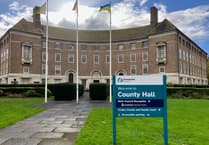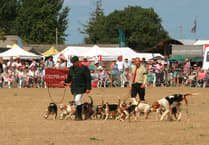Garden party success
Dear Editor
Thank you to The Labrador Rescue, Somerset Wildlife Trust, Girls Brigade, Minehead Methodist and Baptist Churches, Dunster Castle, Paula's Cards and The Greyhound Trust who had stalls.
The Watchet Town Band for playing and everyone who helped and came along to support Westerley Christian Care Homes annual Garden Party last Saturday, September 6.
We were so lucky with the weather and managed to raise the brilliant amount of £862.35 for residents' activities.
Thank you everyone,
Ian Atkins
Minehead
No more beach cleans by dog walkers
Dear Editor,
Whilst it’s all very good doing a beach clean up, let’s take a slightly different perspective on the matter.
As an owner of two dogs, when the dogs where allowed the full use of Minehead beach when the restrictions had lapsed a couple of years ago me and many dog owners who walked their dogs on the beach used to take plastic bags on the beach with us and clean any litter or rubbish that the tourists had left behind, including glass, cans, nappies plastic spades trainers paper and plastics.
Then the council, who really don’t think things through, banned dogs through the summer season again.
A compromise could have been reached. Then the beach would have still been cleaned all year long free of charge, ie dogs allowed on the full beach all year long but summer season time restrict it to 6pm till 8am.
After all dog owners pay council tax too.
Regards,
Keith Lawton, via email
Commemorating 80 years
Dear Editor,
As we remember the end of the Second World War, readers may be interested to know that the threat of invasion was so real, George VI called for seven National Days of Prayer at critical times. Fear was such that on each National Day of Prayer churches were filled with people pleading for divine intervention.
The first National Day of Prayer took place in May 1940. The British Army was trapped at Dunkirk and so George 6th called for a National Day of Prayer to be held on May 26. In a national broadcast he urged people to plead for Divine help. People across the British Isles flocked into churches praying for deliverance and this photograph below shows the scene outside Westminster Abbey as people queued for prayer. Two events immediately followed. Firstly, a storm arose over the Dunkirk region grounding the Luftwaffe which had been killing thousands on the beaches. And secondly, a calm descended on the Channel, such as hadn’t been seen for a generation. It was only because of this Channel calm coming at this precise moment and lasting the length of the evacuation, that tiny boats were able to sail across and rescue 335,000 soldiers. Because of this sudden Channel calm people referred to what happened as “the Miracle of Dunkirk”.
The second and third National Days of Prayer were held during the Battle of Britain. Hitler now sought to destroy the RAF and its airfields prior to invasion. As events became critical, the King called for a Day of Prayer at the height of the battle on August 11, 1940. During the following week Spitfires and Hurricanes managed to destroy 180 Nazi bombers. This brought temporary relief, however on August 30, 800 enemy aircraft filled the skies intending to destroy RAF airfields. By September 6 the situation was again dire and defeat in the air looked inevitable. The King then called for another National Day of Prayer on September 8. That week 185 enemy aircraft were shot down and Goering gave up his assault. On September 15 Churchill was able to declare victory in the air.
The fourth National Day of Prayer was called for by the King on March 23, 1941 during a period of heavy bombing in London. He was completely unaware that this was the actual date planned by Hitler for the invasion. German ships were blown off course and Hitler then changed his plans, switching instead to invading Russia.
The fifth National Day of Prayer took place on September 3, 1942 when the British Eight Army had been driven back to the borders of Egypt by Rommel’s Afrika Korps. General Montgomery was appointed as the Eighth Army Commander and led British forces to victory at El Alamein. This battle was the turning point of the war.
The sixth National Day of Prayer was held on September 3, 1943, the fourth anniversary of the declaration of war on Germany. Italy surrendered to the Allies within 24 hours and Mussolini was killed.
The Seventh Day of Prayer was in spring 1944 for all military personnel in preparation for the liberation of Europe. This was then followed by an additional call on D-Day itself not only for nationwide prayer, but for a worldwide prayer vigil. The poor weather that had delayed the D-Day offensive by 24 hours had suddenly lifted on 6th June and allowed the invasion to go ahead with far fewer lives lost than were expected.
Immediately after the Miracle of Dunkirk the Nazi Army stood on the other side of the Channel with over two hundred divisions flushed with victory. Most of our weapons had been abandoned in France so all Britain had was less than one division of armed troops. No wonder people prayed for Divine help and the King called for National Days of Prayer. In October 1942 Winston Churchill was so moved by events that he said, “I have a feeling sometimes that some Guiding Hand has interfered. I have a feeling that we have a Guardian because we have a great Cause, and we shall have that Guardian so long as we serve that Cause faithfully. And what a Cause it is!”
Yours sincerely,
Rev J Williams, via email





Comments
This article has no comments yet. Be the first to leave a comment.